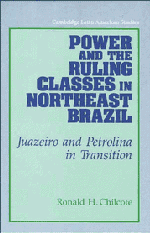Book contents
- Frontmatter
- Contents
- List of tables and figures
- Preface
- PART I THE TRADITIONAL SERTÃO
- 1 The background
- 2 The structure of power and the ruling class
- 3 Juazeiro: cohesion and factionalism
- 4 Petrolina: patriarchy and family dominance
- 5 The ruling class and the polity
- 6 The ruling class and the economy
- 7 The ruling class in civic and social life
- 8 Ideology
- 9 Development and underdevelopment
- 10 Participation, mobilization, and conflict
- PART II THE SERTÃO REVISITED
- Appendix
- Bibliography
- Index
- CAMBRIDGE LATIN AMERICAN STUDIES
9 - Development and underdevelopment
from PART I - THE TRADITIONAL SERTÃO
Published online by Cambridge University Press: 30 September 2009
- Frontmatter
- Contents
- List of tables and figures
- Preface
- PART I THE TRADITIONAL SERTÃO
- 1 The background
- 2 The structure of power and the ruling class
- 3 Juazeiro: cohesion and factionalism
- 4 Petrolina: patriarchy and family dominance
- 5 The ruling class and the polity
- 6 The ruling class and the economy
- 7 The ruling class in civic and social life
- 8 Ideology
- 9 Development and underdevelopment
- 10 Participation, mobilization, and conflict
- PART II THE SERTÃO REVISITED
- Appendix
- Bibliography
- Index
- CAMBRIDGE LATIN AMERICAN STUDIES
Summary
In 1963 the Brazilian economist Celso Furtado noted that the masses of Brazilians who work in the fields had not benefited from the notable economic development of recent years. Their standard of living had declined in comparison to that of people in commerce and other services. Furthermore, the living conditions of industrial workers had not improved. Brazilian development had disproportionately favored higherincome groups, generally in the Center-South urban areas such as Rio de Janeiro and São Paulo. The distortions in Brazilian development were the consequence of policies that permitted a growing concentration of income, both socially and geographically. Furtado saw revolution as one solution and pointed to two aspects of a possible revolutionary process in particular: On the one hand, peasant movements, adopting techniques of Marxism–Leninism, might take the lead in dismantling the archaic agrarian structure; on the other, a Marxist–Leninist revolution might substitute the dictatorship of one class for that of another class. He argued that reforms in the agrarian structure and in government administration would be preferable to these revolutionary alternatives, but he expressed sympathy for the Marxism that permeated Brazilian thought, especially among the youth, because it “affords a diagnosis of the social reality and a guide to action.”
The military intervention of 1964 was counter to Furtado's vision of reforming Brazil as an open society. The military undertook to restructure society but in a way that would perpetuate, indeed accentuate, class differences. Some of the economic goals included control of inflation, stimulation of economic growth, and elimination of inefficiencies and corruption in the government bureaucracy.
- Type
- Chapter
- Information
- Power and the Ruling Classes in Northeast BrazilJuazeiro and Petrolina in Transition, pp. 215 - 229Publisher: Cambridge University PressPrint publication year: 1990



